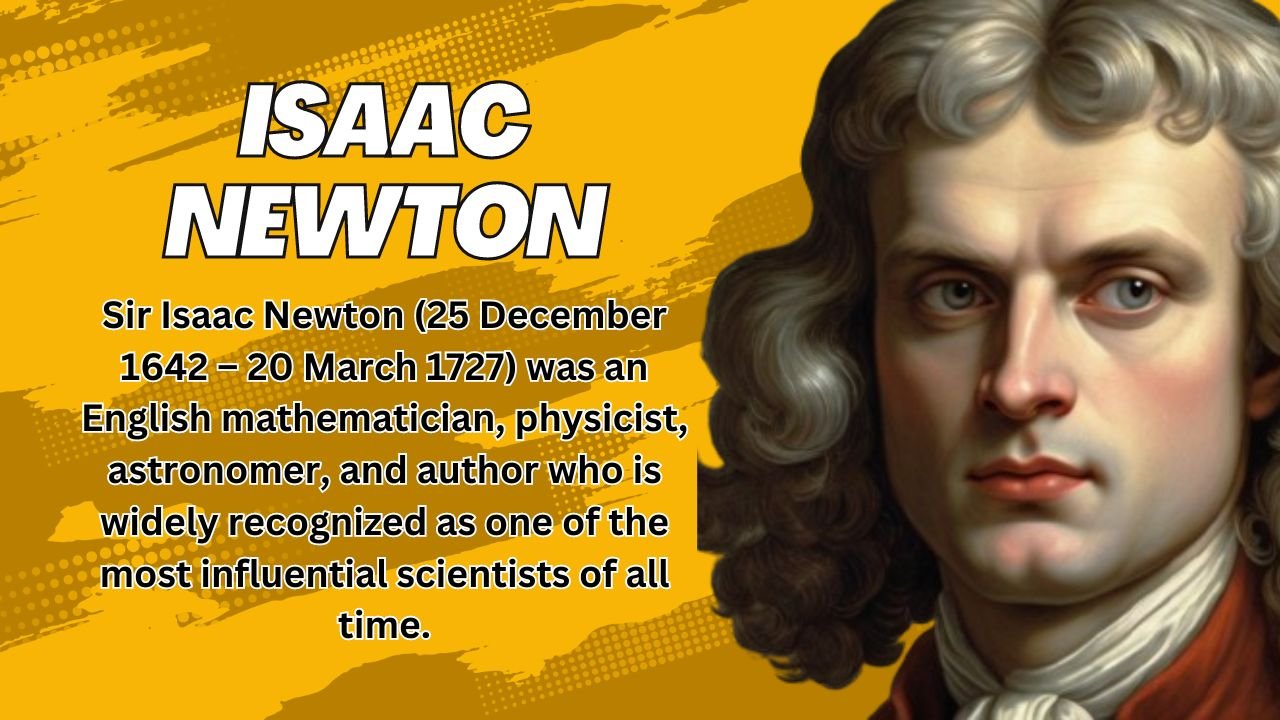Isaac Newton’s Biography,
| Full Name | Sir Isaac Newton |
| Birth | 25 December 1642, Woolsthorpe, Lincolnshire, England |
| Death | 20 March 1727, Kensington, London, England |
| Nationality | English |
| Education | The King’s School, Grantham; Trinity College, Cambridge |
| Fields | Mathematics, Physics, Astronomy |
| Key Contributions | – Laws of Motion – Law of Universal Gravitation – Development of Calculus – Binomial Theorem – Nature of Light and Color – Reflecting Telescope |
| Major Works | – “Philosophiæ Naturalis Principia Mathematica” (1687) – “Opticks” (1704) |
| Positions Held | – Lucasian Chair of Mathematics, Cambridge University – Fellow and President of the Royal Society – Warden and Master of the Royal Mint |
| Influences | Aristotle, Galileo, Kepler |
| Awards and Honors | Knighted by Queen Anne in 1705 |
| Personal Interests | Alchemy, Theology |
| Famous Quotes | – “If I have seen further, it is by standing on the shoulders of giants.” – “I can calculate the motion of heavenly bodies but not the madness of people.” |
Sir Isaac Newton (25 December 1642 – 20 March 1727) was an English mathematician, physicist, astronomer, and author who is widely recognized as one of the most influential scientists of all time. He made seminal contributions to many fields, laying the groundwork for classical mechanics and advancing the scientific revolution.
Early Life
- Birth and Family: Born in Woolsthorpe, Lincolnshire, England. His father died three months before his birth.
- Education: Attended The King’s School in Grantham and later enrolled at Trinity College, Cambridge.
- Early Interests: Exhibited an early interest in mechanics and building models of various machines.
Education and Early Career
- Higher Education: Graduated from the University of Cambridge, where he was influenced by the works of Aristotle, Galileo, and Kepler.
- The Plague Years: During the plague years of 1665-1666, he returned home and made significant advances in calculus, optics, and gravitation.
Major Scientific Contributions
- Mathematics
- Calculus: Developed the fundamental principles of calculus, independently of Leibniz, which are foundational to modern mathematics.
- Binomial Theorem: Extended the binomial theorem to non-integer exponents.
- Physics
- Laws of Motion (1687): Formulated the three laws of motion, which are the cornerstone of classical mechanics.
- An object remains at rest or in uniform motion unless acted upon by a force.
- The acceleration of an object is proportional to the net force acting on it and inversely proportional to its mass.
- For every action, there is an equal and opposite reaction.
- Law of Universal Gravitation: Proposed that every particle of matter in the universe attracts every other particle with a force that is directly proportional to the product of their masses and inversely proportional to the square of the distance between their centers.
- Laws of Motion (1687): Formulated the three laws of motion, which are the cornerstone of classical mechanics.
- Optics
- Nature of Light and Color: Demonstrated that white light is composed of a spectrum of colors, which can be separated and recombined using prisms.
- Reflecting Telescope: Invented the reflecting telescope, which used mirrors instead of lenses, reducing chromatic aberration.
Later Years
- Academic Positions: Held the Lucasian Chair of Mathematics at Cambridge University.
- Royal Society: Became a fellow and later the president of the Royal Society, greatly influencing the scientific community.
Personal Life
- Alchemical and Religious Interests: Conducted extensive research in alchemy and theology, with many of his manuscripts on these subjects published posthumously.
- Political Career: Served as Warden and later Master of the Royal Mint, where he oversaw the English currency.
Legacy
- Principia Mathematica (1687): Published “Philosophiæ Naturalis Principia Mathematica,” which laid the groundwork for classical mechanics.
- Cultural Impact: Newton’s work has profoundly influenced science, philosophy, and the broader intellectual landscape.
- Newtonian Mechanics: His laws of motion and universal gravitation dominated the scientific view of the physical universe for the next three centuries.
Key Publications
- “Philosophiæ Naturalis Principia Mathematica” (1687): Newton’s magnum opus, detailing his laws of motion and law of universal gravitation.
- “Opticks” (1704): A comprehensive study of the nature of light and color.
Quotes
- On Knowledge: “If I have seen further, it is by standing on the shoulders of giants.”
- On Scientific Inquiry: “I can calculate the motion of heavenly bodies but not the madness of people.”
Read More Quotes of Isaac Newton
Conclusion
Sir Isaac Newton’s contributions to science are unparalleled. His work laid the foundation for many scientific disciplines, and his influence extends far beyond his lifetime, making him a central figure in the history of science.
References and Further Reading
- Biographies: “Isaac Newton” by James Gleick, “Newton: The Making of Genius” by Patricia Fara.
- Scientific Papers: Collections of Newton’s original papers can be accessed through various academic archives.
- Documentaries and Films: Various documentaries provide in-depth insights into his life and scientific achievements.

